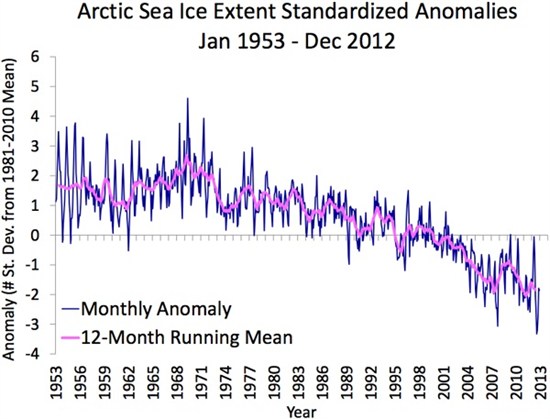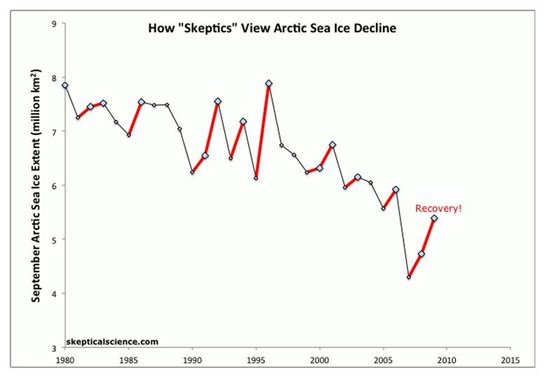Oopsie....
Global warming? No, actually we're cooling, claim scientists
A cold Arctic summer has led to a record increase in the ice cap, leading experts to predict a period of global cooling.
There has been a 60 per cent increase in the amount of ocean covered with ice compared to this time last year, they equivalent of almost a million square miles.
In a rebound from 2012's record low an unbroken ice sheet more than half the size of Europe already stretches from the Canadian islands to Russia's northern shores, days before the annual re-freeze is even set to begin.
The Northwest Passage from the Atlantic to the Pacific has remained blocked by pack-ice all year, forcing some ships to change their routes.
A leaked report to the UN Intergovernmental Panel on Climate Change (IPCC) seen by the Mail on Sunday, has led some scientists to claim that the world is heading for a period of cooling that will not end until the middle of this century.
If correct, it would contradict computer forecasts of imminent catastrophic warming. The news comes several years after the BBC predicted that the arctic would be ice-free by 2013.
Despite the original forecasts, major climate research centres now accept that there has been a “pause†in global warming since 1997.
The original predictions led to billions being invested in green measures to combat the effects of climate change.
The change in the predictions has led to UN's climate change's body holding a crisis meeting, and the the IPCC was due to report on the situation in October. A pre-summit meeting will be held later this month.
But leaked documents show that governments who fund the IPCC are demanding 1,500 changes to the Fifth Assessment Report - a three-volume study issued every six or seven years – as they claim its current draft does not properly explain the pause.
The extent to which temperatures will rise with carbon dioxide levels, as well as how much of the warming over the past 150 year, a total of 0.8C, is down to human greenhouse gas emissions are key issues.
The IPCC says it is “95 per cent confident†that global warming has been caused by humans - up from 90 per cent in 2007 – according to the draft report.
However, US climate expert Professor Judith Curry has questioned how this can be true as that rather than increasing in confidence, “uncertainty is getting bigger†within the academic community.
Long-term cycles in ocean temperature, she said, suggest the world may be approaching a period similar to that from 1965 to 1975, when there was a clear cooling trend.
At the time some scientists forecast an imminent ice age.
Professor Anastasios Tsonis, of the University of Wisconsin, said: 'We are already in a cooling trend, which I think will continue for the next 15 years at least. There is no doubt the warming of the 1980s and 1990s has stopped.â€
The IPCC is said to maintain that their climate change models suggest a pause of 15 years can be expected. Other experts agree that natural cycles cannot explain all of the recorded warming.
A cold Arctic summer has led to a record increase in the ice cap, leading experts to predict a period of global cooling.
There has been a 60 per cent increase in the amount of ocean covered with ice compared to this time last year, they equivalent of almost a million square miles.
In a rebound from 2012's record low an unbroken ice sheet more than half the size of Europe already stretches from the Canadian islands to Russia's northern shores, days before the annual re-freeze is even set to begin.
The Northwest Passage from the Atlantic to the Pacific has remained blocked by pack-ice all year, forcing some ships to change their routes.
A leaked report to the UN Intergovernmental Panel on Climate Change (IPCC) seen by the Mail on Sunday, has led some scientists to claim that the world is heading for a period of cooling that will not end until the middle of this century.
If correct, it would contradict computer forecasts of imminent catastrophic warming. The news comes several years after the BBC predicted that the arctic would be ice-free by 2013.
Despite the original forecasts, major climate research centres now accept that there has been a “pause†in global warming since 1997.
The original predictions led to billions being invested in green measures to combat the effects of climate change.
The change in the predictions has led to UN's climate change's body holding a crisis meeting, and the the IPCC was due to report on the situation in October. A pre-summit meeting will be held later this month.
But leaked documents show that governments who fund the IPCC are demanding 1,500 changes to the Fifth Assessment Report - a three-volume study issued every six or seven years – as they claim its current draft does not properly explain the pause.
The extent to which temperatures will rise with carbon dioxide levels, as well as how much of the warming over the past 150 year, a total of 0.8C, is down to human greenhouse gas emissions are key issues.
The IPCC says it is “95 per cent confident†that global warming has been caused by humans - up from 90 per cent in 2007 – according to the draft report.
However, US climate expert Professor Judith Curry has questioned how this can be true as that rather than increasing in confidence, “uncertainty is getting bigger†within the academic community.
Long-term cycles in ocean temperature, she said, suggest the world may be approaching a period similar to that from 1965 to 1975, when there was a clear cooling trend.
At the time some scientists forecast an imminent ice age.
Professor Anastasios Tsonis, of the University of Wisconsin, said: 'We are already in a cooling trend, which I think will continue for the next 15 years at least. There is no doubt the warming of the 1980s and 1990s has stopped.â€
The IPCC is said to maintain that their climate change models suggest a pause of 15 years can be expected. Other experts agree that natural cycles cannot explain all of the recorded warming.





Comment